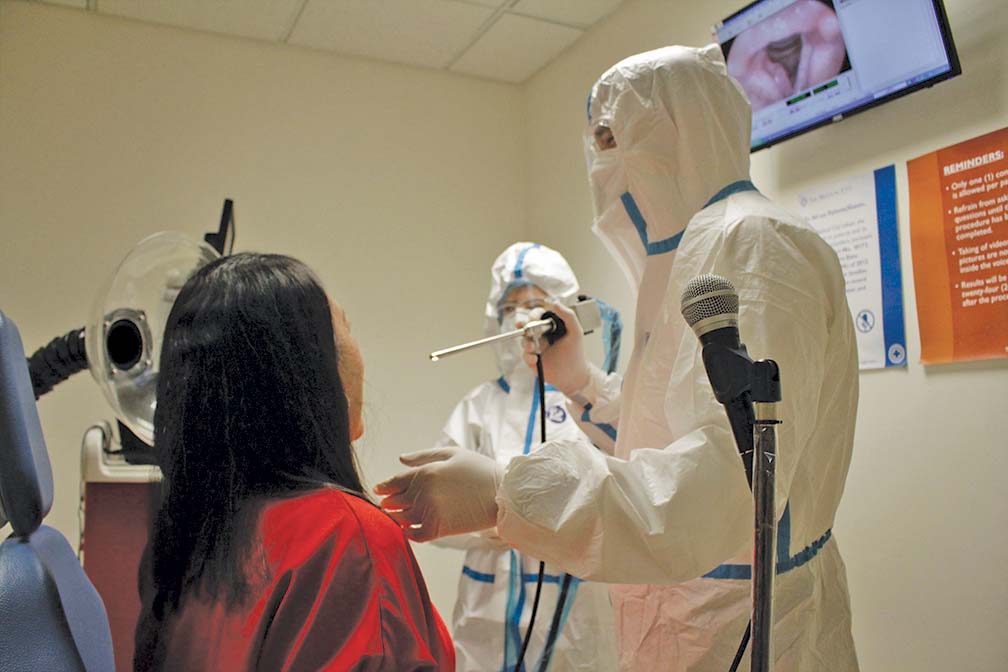“Words mean more than what is set down on paper. It takes the human voice to infuse them with deeper meaning.”
This statement comes from Maya Angelou, a prolific writer of poems and memoirs, who knew how important the voice was. Using the voice to recite or read her stories out loud with the right emotions is the ultimate way to touch people.
What is the voice? According to the American Academy of Otolaryngology–Head and Neck Surgery, the voice is the sound that is made by the vibration of the vocal cords. The vocal cords vibrate when air is passed between them as they come together and sound is produced. The voice is our primary means of communication, both for work and recreation.
The importance of the voice is celebrated yearly on April 16. On World Voice Day, everyone is encouraged to assess their vocal health and to take action to improve or maintain good voice habits. This year’s theme is “One World, Many Voices.”
VOCAL HEALTH

When it comes to vocal health, Dr. Patrick Henry S. Enriquez, an otolaryngologist and the Section Head of the Center for Voice and Swallowing Disorders of The Medical City, said laryngitis is the most common condition that he encounters in his practice. The Mayo Clinic defines laryngitis as the inflammation of the voice box or larynx due to overuse, irritation or infection.
“Laryngitis has many causes. It can happen if you talk too much, shout, scream or you are abusive to your voice,” Dr. Enriquez explained. “If you misuse your voice, your vocal cords get swollen, they get red, inflamed and then you become hoarse usually for a few days. And if you rest, everything will get better.”
However, Dr. Enriquez pointed out that if your profession requires you to use your voice and you still have to use your voice when you get home to look after your family, there is a danger that you can develop lesions on the vocal cords.
“We call them benign vocal cord lesions and these lesions can include nodules, polyps and cysts,” he said. “These lesions develop when the vocal cords close and vibrate, causing benign vocal cord lesions to develop in the stress area of the vocal cords.”
ACID REFLUX
Another condition that can cause laryngitis is acid reflux. This happens when you have excessive acid in the stomach and it overflows and goes to your throat. When this happens, you start to secrete a lot of mucus in the throat and you tend to do frequent throat clearing

“Frequent throat clearing can irritate the vocal cords,” Dr. Enriquez explained. “Even if you are not shouting, screaming or not talking a lot, but if you have the habit of always clearing your throat and you are trying to force it out, it is almost the same as shouting. All of that can cause lesions on the vocal cords.”
If there are benign vocal cord lesions, there are also malignant vocal cord lesions that lead to laryngeal cancer, one of the most serious ailments that a patient can develop when it comes to the voice.
“That’s why it is really important that when you have hoarseness, you consult with a specialist so that the diagnosis will be accurate,” Dr. Enriquez said. “When you catch laryngeal cancer at an early stage, that means that treatment will be very successful and you can prolong the life of the patient.”
VICES
Other factors that affect the voice are smoking, alcohol and e–cigarettes or vapes. He related that he had personally seen patients who had inflammatory lesions in the airway caused by overuse.
While studies have not confirmed this, Dr. Enriquez said because of its heating element, the vape caused burns in the tissues located inside the throat. This caused the tissues to be inflamed in an unusual manner.
“And then when I asked the patient what he had been doing, he said he had been vaping, vaping excessively,” he said. “Drinking too much coffee can also have a drying effect on the throat and can also lead to hyperacidity, which in turn will cause acid reflux.
The COVID–19 virus can also affect the voice. Dr. Enriquez related that a patient was referred to the Center since she had been complaining of consistent hoarseness and voice weakness after surviving COVID–19 without being intubated. He explained to the patient that the problem was with her lungs.
“There are three requirements needed to produce the voice. Number one is your lungs. It supplies the air. When we produce our voice, the air inside the lungs is what gives power to the voice,” Dr. Enriquez explained. “If there is a problem with your lungs, your voice is be weak. You have a hard time talking and speaking.”

There are also instances when the patient suffers injuries to the vocal cords because of the effects of prolonged intubation. The patient starts to develop inflammatory lesions after being intubated for more than two weeks.
VOICE CARE TIPS
To look after your voice and to prevent the development of voice related ailments, Dr. Enriquez offered the following pieces of advice:
1. Drink a lot of water. According to Dr. Enriquez, the voice box, larynx and throat need a lot of lubrication. “Sometimes when it is irritated and you have a lot of mucous in your throat, the best way is not to keep on coughing and expelling it. You just swallow it by taking sips of water,” he said. He added that if you are well hydrated, the secretions will be thinner and easier to manage.
2. Get good rest. Dr. Enriquez said sleep deprivation can affect the quality of your voice. “If you are well rested, you have a good amount of sleep, that’s good for you and voice.”
3. Avoid irritants. Avoid cigarettes, alcohol, too much coffee and citrus, acidic and spicy food as this might contribute to acid reflux.
4. Avoid vocal strain. Shouting, screaming, prolonged talking, talking with a loud voice and in a noisy environment can lead to vocal strain.
5. If you have a hoarse voice or a painful throat, you should refrain from talking. Dr. Enriquez said these are already signs that you need to already rest., However, if these symptoms persist, it is best to consult a specialist so that they can check on the vocal cords if needed.
6. Avoid lying down after eating. He noted that this sometimes cannot be avoided because there are times people go home late, have dinner and need to go to sleep. “It takes two hours for the stomach to digest the food and then finally transfer them to the intestines,” Dr. Enriquez explained. “But once it is there, it continues to produce a lot of acid and so when you lie down, some of the acid can back flow and cause acid reflux.
7. Relatedly, it is advised that you lie down on your left side. This will allow the food to go to your intestines. “But when you lie on your right side, you can feel the acid in your throat,” Dr. Enriquez said. “That’s why we advise patients to avoid tomato–based food, spicy food, anything acidic at night, especially if they are already showing signs of acid reflux.”
“Don’t abuse your voice and drink a lot of water. But if you feel any hoarseness, always consult a specialist for the right diagnosis,” Dr. Enriquez reiterated.


